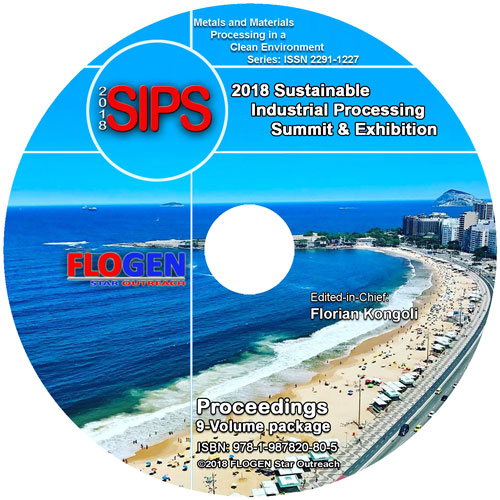2018-Sustainable Industrial Processing Summit
SIPS2018
Volume 6. New and Advanced Materials and Technologies
| Editors: | F. Kongoli, F. Marquis, P. Chen, T. Prikhna, N. Chikhradze |
| Publisher: | Flogen Star OUTREACH |
| Publication Year: | 2018 |
| Pages: | 392 pages |
| ISBN: | 978-1-987820-92-8 |
| ISSN: | 2291-1227 (Metals and Materials Processing in a Clean Environment Series) |

CD shopping page
Biodiesel Production from Brown Grease
Marina Nisnevitch1; Faina Nakonechny1; Mirit Kolet1; Daniel Zerbib1;1ARIEL UNIVERSITY, Ariel, Israel;
Type of Paper: Regular
Id Paper: 202
Topic: 43
Abstract:
Massive use of fossil fuels has led to an increase in the CO<sub>2</sub> concentration in the atmosphere, and this has caused global climate changes. In contradistinction, biofuels, which are produced from plant sources, and in particular biodiesel, do not affect the greenhouse gas balance. Conventional sources of biodiesel are agricultural crops, such as corn, soybean, canola, cotton, mustard, and palm. However, use of these crops for biodiesel leads to the depletion of global food resources. The aim of the present study was to develop a scheme for rapid and efficient production of biodiesel from brown grease, i.e. cooking oil waste, which has a high free fatty acids content. Biodiesel is produced by free fatty acid esterification and triglyceride trans-esterification [1]. These processes can be performed under thermal activation and classical homogeneous catalysis; however, this scheme cannot serve for production of biodiesel in a continuous regime [2]. The present research proposes performance of continuous biodiesel production using heterogeneous catalysts. Application of this process can help replace fossil energy sources by renewable biofuels, decrease greenhouse gas exhausts, and contribute to wastewater treatment.
Keywords:
Alternative energy sources; Environment; Renewable energy; Water purification;References:
[1] A. Demirbas. Biodiesel Fuels from Vegetable Oils Via Catalytic and Non-Catalytic Supercritical Alcohol Transesterifications and Other Methods: A Survey. Energy Convers. Manag. 44 (2003) 2093-2109.[2] C. V. McNeff, L.C. McNeff, B. Yan, D.T. Nowlan, M. Rasmussen, A.E. Gyberg, B.J. Krohn, R.L. Fedie, T.R. Hoye. A Continuous Catalytic System for Biodiesel Production. Appl. Catal. A Gen. 343 (2008) 39-48.